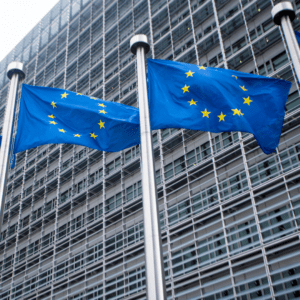Reconociendo la influencia significativa de la IA, la Unión Europea ha asumido un papel pionero con la introducción de la Ley de IA de la UE.
Esta legislación histórica tiene como objetivo crear un ecosistema equilibrado donde la IA pueda florecer de manera responsable, fomentando la innovación al tiempo que se garantiza la seguridad, la transparencia y el respeto por los derechos humanos.
A medida que la IA sigue evolucionando, el marco regulatorio de la Ley de IA de la UE promete profundas implicaciones en los ámbitos ético, económico y tecnológico.

Aspectos clave de la Ley de IA de la UE
En su esencia, la Ley de IA de la UE establece un marco legal integral para guiar el desarrollo, implementación y aplicación de la IA en toda la Unión Europea. Su objetivo principal es promover el uso de tecnologías de IA de una manera que proteja la seguridad y los derechos fundamentales de los usuarios. Con este fin, la Ley categoriza los sistemas de IA según sus niveles de riesgo, desde mínimo hasta inaceptable, aplicando regulaciones progresivamente más estrictas a las categorías de mayor riesgo.
Disposiciones Importantes y Clasificaciones de Riesgo
La Ley de IA de la UE introduce requisitos estrictos para las aplicaciones de IA de alto riesgo, abarcando áreas como infraestructura crítica, educación, gestión del empleo, aplicación de la ley y procesos democráticos. Estas categorías de alto riesgo están sujetas a estrictas medidas de cumplimiento que incluyen evaluaciones de riesgo, mayor transparencia y protocolos rigurosos de gobernanza de datos. Además, la Ley adopta una postura firme contra las aplicaciones de IA que plantean riesgos inaceptables, como sistemas manipulativos o aquellos que permiten el 'puntuación social' por parte de los gobiernos, al prohibir su uso por completo.

Efectos en la Innovación y la Competencia Global
La Ley de IA de la UE está destinada a establecer un referente global para la regulación de la IA, con implicaciones significativas para la innovación y la competencia. Proporciona un marco legal claro que podría aumentar la confianza en las tecnologías de IA, acelerando potencialmente su adopción e inversión dentro de la UE. Sin embargo, surgen preocupaciones de que regulaciones estrictas puedan imponer a las pequeñas empresas y startups costos de cumplimiento, lo que podría sofocar la innovación y colocar a las empresas europeas en una desventaja competitiva a nivel internacional.

Influencia Global y Liderazgo en la Gobernanza de la IA
Como una regulación pionera, la Ley de IA de la UE podría inspirar a otras regiones a adoptar marcos regulatorios similares, allanando el camino para un enfoque global más uniforme en la gobernanza de la IA. Esta armonización podría mejorar la colaboración internacional en la investigación y el desarrollo de IA, abordando desafíos globales como la privacidad de los datos y el sesgo algorítmico.
Mirando hacia adelante
A medida que la Ley de IA de la UE avanza en el proceso legislativo, enfrentará un análisis y discusión rigurosos. La participación de diversos interesados—empresas tecnológicas, startups, sociedades civiles e instituciones académicas—es crucial para perfeccionar la legislación. El éxito de la Ley en equilibrar la integridad ética con la innovación dependerá de este diálogo inclusivo y dinámico.
En resumen, el enfoque proactivo de la UE con la Ley de IA destaca el papel esencial del desarrollo responsable y transparente de la IA. Nuestro NextBrain La solución de análisis de datos basada en IA se alinea con estos principios, ofreciendo un procesamiento de datos ético y conforme. Descubre cómo nuestra solución puede transformar tu organización al reservar una demostración, empoderándote para aprovechar el potencial de la IA de manera responsable y eficiente.


 +34 910 054 348
+34 910 054 348 +44 (0) 7903 493 317
+44 (0) 7903 493 317